TODAY’S READING FROM THE OLD TESTAMENT- JOEL 1:1-3:21.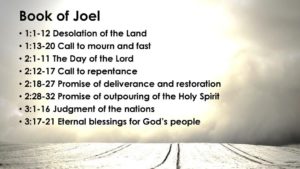
Joel’s name means, “Yahweh is God”. Internal evidence suggests that he prophesied in Jerusalem during the reign of Joash. Some suggest he is one of the earliest of the twelve minor prophets, following approximately 10 years after Obadiah. He possibly could have known Elijah and Elisha in his youth.
The major theme of the Book of Joel is “The Day of the Lord”. A day begins with sunset. The night for judgment comes before the dawn of the return of Christ and His reign upon the earth. God spoke to the prophets often in images. Joel sees the imminent judgment coming upon Israel in a vision of a devastating plague of locusts.
The Day of the Lord is described as a Day of Chastisement for Zion. God is calling His covenant people to repentance (Joel 1:1-2:17).
We will see similar descriptions of the Day of the Lord as we read the Book of the Revelation of Jesus Christ, the last book of the Bible.
The Day of Chastisement is followed by a Day of Blessing to A Repentant Remnant and the Judgment of the Nations.
Joel applies ‘the day of the Lord’ to both present and future events. First, he references a present crisis, the plague of locusts (Joel 1:1-20). Then he warns of the coming Assyrian invasion. Finally, he speaks of a future judgment that is coming upon the whole world.
In the present crisis, God is calling His people to consider their priorities. Why have they neglected to give God His due worship? (1:13). He calls them to reflect upon their spiritual condition as well as their physical condition. They are to humble themselves, call for a fast, and cry out to the Lord (1:14-20).
Joel then asks the people to turn from the physical crisis (the plague of locusts) and recognize that it symbolizes the Assyrian invasion from the north coming as a judgment upon them due to their disobedience. God who sovereignly allowed the plague of locusts, was now allowing the Assyrians to invade and carry the northern kingdom away to be no more. Their land would be occupied by foreigners and become known as Samaria. He would permit the Assyrians to invade Judah also. Isaiah spoke of Assyria’s role as God’s instrument to bring judgment upon His people who had become a godless nation:
Isaiah 10:5-6 5 Woe to Assyria, the rod of My anger and the staff in whose hands is My indignation, 6 I send it against a godless nation and commission it against the people of My fury to capture booty and to seize plunder, and to trample them down like mud in the streets.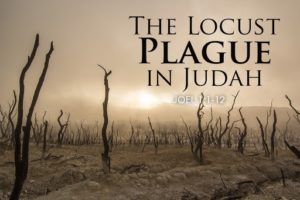
God’s army in Joel Chapter 2, is actually the army of Israel’s enemy, the Assyrians, being used as God’s chastising arm, bringing judgment upon the land. Joel uses the locusts to describe hordes of invaders spreading over the mountains. He graphically diagnoses their condition. They are responsible for turning God’s Eden into a wilderness (Joel 2:3).
Once again God asks the leaders to sound the trumpet and call for a solemn assembly (2:15-16):
Joel 2:12-13 12 “Yet even now,” declares the LORD, “Return to Me with all your heart, and with fasting, weeping and mourning; 13 And rend your heart and not your garments.” Now return to the LORD your God, for He is gracious and compassionate, slow to anger, abounding in lovingkindness and relenting of evil.
God’s character of graciousness, patience, and love should inspire us to be responsive to Him as a people. As individuals and as a community we should recognize our need to repent and return to walking in His ways when He calls for the trumpet to sound.
The Lord promises the dawn of deliverance after the dark time of judgment. Whereas there will be restoration after the exile, a more permanent deliverance is in view—the new covenant age known as the last days leading up to the day of the Lord climaxing with the return of Christ (See Acts 2:17).
Joel 2:28-29 28 “It will come about after this that I will pour out My Spirit on all mankind; and your sons and daughters will prophesy, your old men will dream dreams, Your young men will see visions. 29 “Even on the male and female servants I will pour out My Spirit in those days.
During the Old Testament period, the Holy Spirit was only given to a select few, those who were appointed to specific tasks, such as the craftsmen building the tabernacle, Moses, the judges, King David, and the prophets. But in the church age, the Spirit would come upon all kinds of people, all mankind, men, and women, old and young, Jew and Gentile.
God promises that a remnant will be salvaged from every tribe and tongue.
Joel 2:32 32 “And it will come about that whoever calls on the name of the LORD Will be delivered; for on Mount Zion and in Jerusalem there will be those who escape, As the LORD has said, Even among the survivors whom the LORD calls.
The apostle Peter did not say that this prophecy was fulfilled on the Day of Pentecost. He said that this is what Joel spoke of. There is more in the prophecy that is yet to be fulfilled, such as Joel 2:30-31:
Joel 2:30-31 30 “I will display wonders in the sky and on the earth, Blood, fire and columns of smoke. 31 “The sun will be turned into darkness and the moon into blood Before the great and awesome day of the LORD comes.
Joel reminds us that the nation of Israel (north and south) will be restored, and the nations of the earth will be called to judgment (Joel 3:1f). They will be gathered in a great battle during the tribulation period in the Valley of Jehoshaphat, meaning ‘the Lord judges’.
Joel lists some of the sins that the Gentiles have committed against the Jews. All sin, including, Anti-Semitism will be brought to account (3:2-8).
Joel 3:9-15 describes what is known in the Book of Revelation as the Battle of Armageddon. This is when the armies of the world gather to war against the Lord and destroy Jerusalem.
This battle is described metaphorically as God’s means of bringing judgment fully and swiftly to the nations. The judgment is likened to harvesting grapes, thus the expression ‘the grapes of wrath’. God will defeat the enemy as decisively as one plucks ripened grapes and has them trampled or crushed at the winepress. The Lord brings them to judgment as swiftly as the swipe of the sickle brings down stalks of grain to have them sifted, separating grain from chaff.
The permanency of God’s vindication is clear:
Joel 3:20-21 20 But Judah will be inhabited forever And Jerusalem for all generations. 21 And I will avenge their blood which I have not avenged, For the LORD dwells in Zion.
TODAY’S READING FROM THE NEW TESTAMENT – REVELATION 1:1-20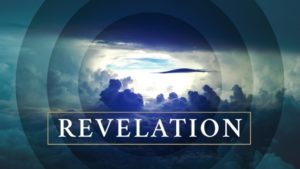
The Book of Revelation is the last Book of the Bible, and it is the crowning conclusion to the history of redemption.
It is not necessary to understand every detail in order to profit spiritually from this book. It is the only book in the New Testament that has a God-given guarantee that you will be blessed if you read it, hear it, and heed it (Revelation 1:3).
Of the 404 verses in the book of Revelation, seemingly 278 of them make some allusion to the Old Testament. That is 68.8% of the verses! And some of these verses contain two, or even three, allusions to the Old Testament.
However, by a careful study of the Bible, we can understand that most of them come from the prophetic books of Isaiah, Ezekiel, Daniel, and Zechariah.
The Book is rightly titled: “The Revelation of Jesus Christ”. The word, ‘revelation’ is ‘apocalypsis’ in the Greek language. We get the English word, ‘Apocalypse’ from it, and it means, ‘unveiling’. Although, in our contemporary language it is often used to describe some catastrophic event, similar to those found in the final judgments God brings upon the world according to this Book.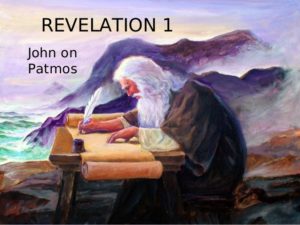
John records the Book of Revelation in the last decade of the first century. He is the only surviving apostle of the original 12. John’s brother, James, was the first of the 12 to be martyred (Acts 12:2). John would be the last to die.
The Roman Emperor Titus Flavius Domitian demands that he be worshiped as Lord and God. Christians who refuse this edict are persecuted. John is banished to the island of Patmos off the coast of Asia Minor, inhabited by prisoners and lunatics. There, John receives the revelation of Jesus as Lord and God.
The Father is giving this revelation to the Son who will give it by an angel to John on the island of Patmos.
Revelation 1:1-2 1 The Revelation of Jesus Christ, which God gave Him to show to His bond-servants, the things which must soon take place; and He sent and communicated it by His angel to His bond-servant John, 2 who testified to the word of God and to the testimony of Jesus Christ, even to all that he saw.
We know that both Moses and Daniel received God’s Word with the help of an angel (Hebrews 2:2; Galatians 3:19; Daniel 8:16-19; 9:21-23). But the Book of Revelation is the only book in the New Testament that is given by the mediation of an angel.
Angels are referred to 67 times in the Book of Revelation.
John is told to write the things he is seeing in the present moment. This is what is recorded in Chapter 1- (his seeing the glorified Jesus on the island of Patmos). He is then to record the things which are (Chapters 2 and 3- Christ’s directions for the seven churches of Asia Minor). Finally, he is to record the things which will take place after these things (Revelation Chapters 4-22).
He is writing to the seven churches of Asia Minor, but the letter is immensely instructive for us today.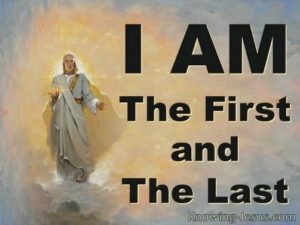
This divine ‘unveiling’ discloses that Jesus is Almighty God, the second Person of the Trinity. He is the Sovereign Ruler of the earth (1:5). He is eternal and shares the attributes of God the Father and God the Holy Spirit. He is soon to be coming in the clouds as the appointed Judge of the whole earth (1:7). Every eye will see Him including those who pierced Him, and all the tribes of the earth will mourn over Him.
Jesus shares the eternality of the Father and the Spirit. He is the Alpha and Omega, Who is and Who was and is to come, the Almighty.
John first hears the voice commanding him to write what he sees and send it to the seven churches of Asia Minor.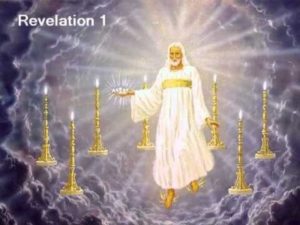
John then turns and sees the voice that was speaking to Him. The person of the glorified Lord Jesus is seen standing in the midst of the seven candlesticks. Each of the candlesticks represents a different church. The purpose of the candlesticks is to illuminate the Lord who stands in their midst.
There are clues here that this apocalyptic imagery is not to be taken literally, but that they are symbols pointing to the majesty of our Messiah.
His garments are those of a Judge, King, and Priest.
His white hair symbolizes His eternality. His eyes are like a flame of fire. They are all-knowing. Fire can be warm and inviting, and fierce and consuming. Fire can reveal that which is durable and combustible. With His eyes, He can judge righteously. His feet are like burnished bronze, suggesting judgment. The brazen altar is where fire consumed the sin offering. His voice is like the thundering sound of the great falls of the Niagara River.
Out of His mouth comes the sharp two-edged sword, which represents the Word of God. His face shines like the sun in full strength.
The seven stars represent the seven messengers of the seven local churches in Asia Minor. Are these the pastor-teachers? The good news is that the Lord holds these messengers in His hand!
He places these messengers and these churches where He wants them to shine for Him.
TODAY’S READING FROM THE BOOK OF PSALMS – PSALMS 128:1-6
When moms and dads would be traveling with their children to Jerusalem for the annual feasts, it is fitting to have psalms that express gratitude for family.
The Psalmist describes the blessing when parents and children become fruit-bearing disciples.
Psalm 128:3 3 Your wife shall be like a fruitful vine within your house, Your children like olive plants around your table.
The Psalm concludes with a prayer of blessing, a benediction:
Psalm 128:5-6 5 The LORD bless you from Zion, and may you see the prosperity of Jerusalem all the days of your life. 6 Indeed, may you see your children’s children. Peace be upon Israel!
TODAY’S READING FROM THE BOOK OF PROVERBS – PROVERBS 29:18
Proverbs 29:18 18 Where there is no vision, the people are unrestrained, but happy is he who keeps the law.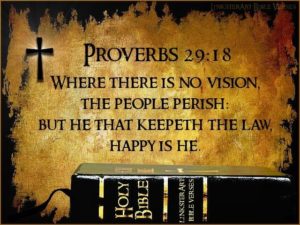
This is one of the most misapplied proverbs. It is not speaking of our need to envision a preferred future. The vision is not speaking of something emerging from our imaginations, but it is speaking of a revelation of God’s righteousness in the law. Without the Word of God, we are lost, unrestrained, and fall apart, but happy is the One who is reconciled to God’s person, purpose, and power in order to fulfill righteousness.
Romans 8:2-3 2 For the law of the Spirit of life in Christ Jesus has set you free from the law of sin and of death. 3 For what the Law could not do, weak as it was through the flesh, God did: sending His own Son in the likeness of sinful flesh and as an offering for sin, He condemned sin in the flesh,
PRAYER- Gracious God and Lord of all, You hold all in Your hands. Even the wrath of men will serve Your Sovereign purpose as You refine Your people. Thank You for Your faithfulness, Your compassion, and Your goodness. Thank You for the promised deliverance from our enemies—the corrupt world system, the old sin nature, and the devil. Help us to stick to the path of life, the highway of holiness. We praise You for the Holy Spirit Who anoints us for service. Make us fruitful disciples in the family of Your church. In Jesus’ Name. Amen.
